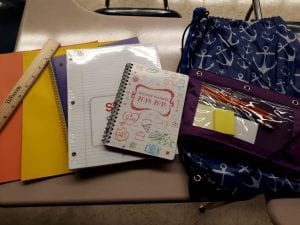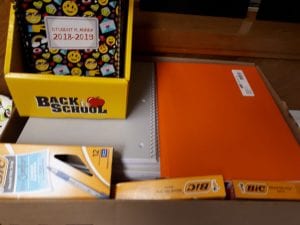There is no book titled “How to Do Education in a Global Pandemic.” I know. I looked for one. I also don’t remember taking a class called “Teaching During Times of National Crisis,” although it occurs to me now maybe there should be such a class. Today, Governor Brown announced schools would be closed for the remainder of the school year. My Facebook feed lit up with educators expressing a range of absolutely valid emotions: fear, confusion, anxiety, sadness, and even anger. Sprinkled between these posts were posts from parents worried about being their child’s primary educator. And in between that, as if to remind me why all this is happening, were posts from writers and friends who have tested positive for covid-19 or who know someone who has or worse, they know someone who has died from it. I’ve struggled with the pandemic for a lot of reasons, and I’ve actively avoided saying most of what’s been in my head. Today seems like the day to put it into words. Maybe it will help others. We’re all in this together, after all.
Decision Making
I’m bad at making decisions on a normal day. If I’m standing in front of the cereal display, even being gluten free, it will take me 20+ minutes to decide which cereal to buy, and I’ll probably change my mind by the time I get to the cash register. In the time of covid-19, every decision feels like it carries the weight of life or death–if not for me, for someone I love, and if not for someone love, for someone they love. These decisions are exhausting. Teaching provides me with a million decisions a day, but they are decisions I’m used to making. By and large, I’m comfortable with them. I’ve created systems and protocols to deal with “round up or not?” “accept late assignment?” “call the parents?” and if I run into something I don’t have my own protocol for, school or district policy helps me make the decision. All of that is gone right now. There aren’t any protocols (see the first sentence of this post). This level of uncertainty adds more stress and anxiety to my daily life. What I’ve had to do to cope with this is carefully and systematically think about which decisions are the most important to make and the things over which I have control. And I’ve had to let myself be okay with someone else making decisions I am used to making and taking control of things I usually have control over. My grading system was overridden (at least for seniors) by the Oregon Department of Education today. And that’s okay. Because you know what? The most important decision isn’t whether to pass or fail a senior in the midst of a global pandemic. The most important decision is how to make sure every senior knows I care about them and their future and that they will be okay. And for the most part, that is also in my control.
Missed Moments
Last year, I stood on a stage at the Oregon FBLA State Business Leadership Conference and accepted the Adviser of the Year award. It was the most gratifying moment of my career. A few months later, I handed diploma covers to school board members who handed them to seniors I’d had since their freshman year. I nodded and smiled at those seniors as they stepped up to receive their diploma during commencement. For a couple of them, I gave our secret signal for taking deep breaths and relaxing through nerves. I’ve come to look forward to doing this, and I’ve had students eagerly tell me, “You better do that when I graduate!” A few weeks later, I watched a young woman I’d mentored for three years give a speech on a stage in front of 13,000 people and follow it up with 16+ hour days on her feet campaigning for national office at the National Leadership Conference for FBLA. I watched two amazing freshman practice every spare second they had until they accepted a plaque on stage at that same event. None of those moments can happen this year. Of course I’m sad. Of course I’m disappointed. Of course I’m heartbroken for my state officer candidates who won’t get to give their speeches on a stage or campaign to their peers and for the seniors who don’t know whether they’ll have a “normal” graduation ceremony or not. But these are also things outside of my control. Do you know what is in my control? How to help these students frame this moment of covid-19 into a healthy learning experience. I’m not talking about where to place commas or how to define business ethics, but the learning experiences that are going to matter to them every moment of their lives from this point forward. These students’ perceptions of the world will largely be determined by how the adults in their lives help them perceive this moment in history. That is an incredible responsibility, but it is also an incredible honor. Which leads me to the next section.
Identity
I don’t think I’m the only educator whose identity is largely wrapped up in how many students pass through their classroom doors. I keep every thank you card, every drawing, every graduation announcement. I have a shelf in my living room of (mostly coffee cups and sloth plushies) gifts students or their parents have given me over the years. All of the time indoors has given me some precious insights into myself. I keep myself busy as to avoid thinking about the crappy things that have happened in my life. I’ve known this for a long time. Quarantine has made that unhealthy coping mechanism impossible, and I’ve learned it’s okay to sit with myself a little bit because it gives me vital context into my own place in this moment in history: I teach because I want to matter.
Without going into the psychology behind this statement, understanding it gives me the ability to frame this experience in a way that produces less anxiety and gives me more control over what the next few months look like for me as an educator and as a person. My decision becomes: What is the most important thing I can do right now for my students? My control becomes: How can I accomplish that learning for students who aren’t physically in my classroom? Now, I have a little bit of an advantage over some of my fellow educators. First, I’m pretty tech savvy already. I use Google classroom and Edmodo and other ed tech tools as part of my regular classroom experience, so I’m not madly re-creating every worksheet into digital format or trying to find the create class button. Second, I’m a gamer, and I spent the better part of 10 years of my life on MMORPGs where I learned that strong, meaningful relationships can be built over the Internet because those relationships aren’t about how we see others’ outsides. It’s how we see them on the inside and how much we let them see us. So here’s my list of things I will be doing in the next couple of months:
- Acknowledge every student, by name, in some fashion just like I would in the classroom.
- Share my own feelings of anxiety and sadness and disappointment with my students, as well as sharing how I am coping with those feelings.
- Provide every student with a moment of joy every week.
- Give every student permission to feel what they feel and also give every student the tools to be successful in this new environment (I’m starting with, “How to write an effective email”)
- Allow students to see me as a real person. (This is something educators are notoriously bad at. It’s okay if they see your dog in the background of your Zoom meeting. It will make them feel comfortable that theirs is barking.)
- Remind students that their worth is not wrapped up in others’ perception of their identity. If I’m struggling because my identity is “teacher” and “teacher” means something different right now, I can only imagine that my athletes are struggling because “athlete” isn’t happening and my academics are struggling because “school” as they know it isn’t happening and my loners might even be struggling because you can’t be a loner if there aren’t other people around.
This last point is perhaps the single most important thing any educator can do for a student right now. Help them problem solve through what their identity means and doesn’t mean. Give them a chance to express who they are in new ways so they understand what I wish I’d understood before I dropped out of high school to be a mom.
Whoever we are, it’s enough, and we shouldn’t need to be in the room with someone else to feel that.





 a student only needs pencils or only needs a pocket folder. I also keep school planners on hand–and I teach students how to use those planners if they are having difficulty getting work turned in on time or managing their extracurriculars. I’ve been known to sit down with a student and help them organize a 3-ring binder for the same purpose. Sometimes it isn’t the lack of the item, but the lack of understanding the most effective way to use the item. When I hear a student say something like, “I’ve tried that and it didn’t work for me,” I immediately offer this.
a student only needs pencils or only needs a pocket folder. I also keep school planners on hand–and I teach students how to use those planners if they are having difficulty getting work turned in on time or managing their extracurriculars. I’ve been known to sit down with a student and help them organize a 3-ring binder for the same purpose. Sometimes it isn’t the lack of the item, but the lack of understanding the most effective way to use the item. When I hear a student say something like, “I’ve tried that and it didn’t work for me,” I immediately offer this. Finally, sometimes I get lucky and I find a great deal on big ticket items. I have clothes hanging in my storage closet–both regular school clothes and business clothes for my Future Business Leaders of America students. And today, I found backpacks on clearance! I reserve these items for students that I know really, really need them. The problem, of course, is that more students really, really need them than I can afford to outfit myself.
Finally, sometimes I get lucky and I find a great deal on big ticket items. I have clothes hanging in my storage closet–both regular school clothes and business clothes for my Future Business Leaders of America students. And today, I found backpacks on clearance! I reserve these items for students that I know really, really need them. The problem, of course, is that more students really, really need them than I can afford to outfit myself.
